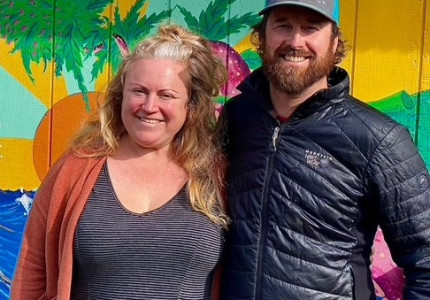Linnet Lockhart, Michelle Peñaloza and Alex Cummings are Ventoso Farms, working side-by-side growing big, beautiful plants in the windy wilds of Covelo.
“I entered the industry in the ‘80’s in Sonoma County, doing a closet indoor grow thing. I didn’t know the difference between male and female plants, so my first grow wasn’t too successful,” Linnet, says, with a laugh.
"I was really intrigued by cannabis. I didn’t get into the industry for the money. I’ve always thought of greed as nine miles of bad road. I just really enjoyed the plants.”
As time went on, Linnet juggled whether to keep her licensure as a therapist or to continue growing cannabis. “Honestly, coming out as bisexual was easier than coming out as a cannabis farmer,” she says.
Linnet and Alex participated in all the = cannabis regulations prior to Proposition 64’s passage.
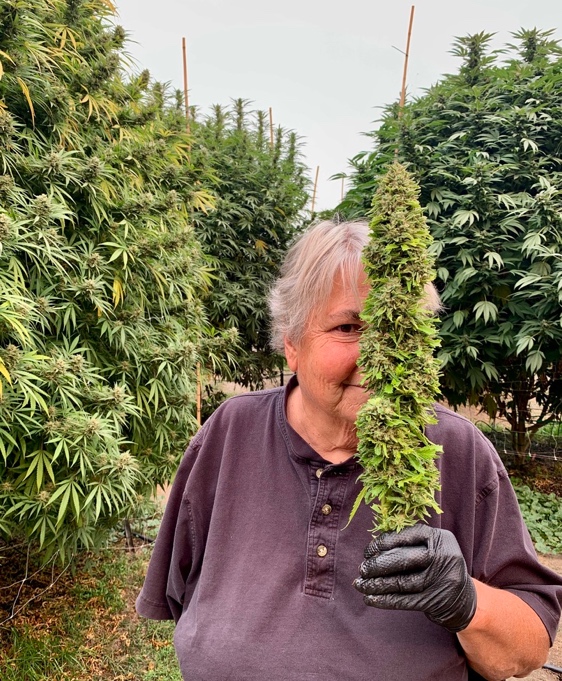 Linnet says, “There have been many changes over the years. First, the Board of Supervisors said 25 plants, then 8 plants, then a 10x10 area. It was crazy back then. Still, some good farming practices emerged. Strains have changed significantly. Access to medicine has changed significantly. Here in Mendo, we have endured a lot of flip-flopping.”
Linnet says, “There have been many changes over the years. First, the Board of Supervisors said 25 plants, then 8 plants, then a 10x10 area. It was crazy back then. Still, some good farming practices emerged. Strains have changed significantly. Access to medicine has changed significantly. Here in Mendo, we have endured a lot of flip-flopping.”
“I didn’t vote for Prop 64 because of its bureaucratic issues. I believe the mess we’re in now is greed-based. Politicians saw what was coming and regulations were designed to make money off farmers,” she continues.
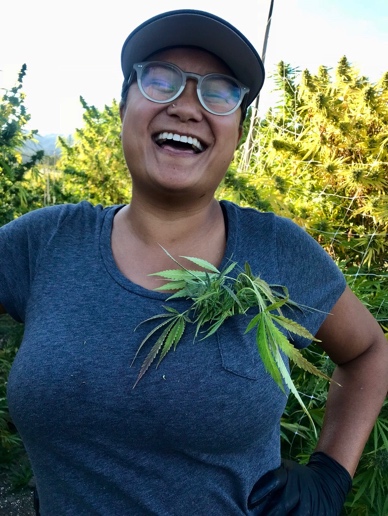 Sharing his entry into the business, Alex says, “I’d moved back to the states after teaching English in Japan. Finding employment during the recession was challenging. A friend introduced me to Linnet in 2010 and we teamed up. It’s hard to believe we’ve been at this for 12 years.”
Sharing his entry into the business, Alex says, “I’d moved back to the states after teaching English in Japan. Finding employment during the recession was challenging. A friend introduced me to Linnet in 2010 and we teamed up. It’s hard to believe we’ve been at this for 12 years.”
“We went through Prop 215, the 9.31 program and…whatever this is today,” Alex says with a laugh. “Regrettably, I voted for Prop 64. Hindsight being 20/20, I was falsely optimistic. It’s been painful for everyone. One positive outcome is many small farms are working more closely together, which is so important.”
“My story with Ventoso is a love story,” Michelle says. “Alex and I are partners in life and in business. We met in Oregon around the time he was moving to Covelo. I was moving to Seattle, but we kept in touch. I started visiting Covelo regularly and eventually made the decision to move here. When I arrived, Linnet asked if I wanted to be part of the farm. I’d grown vegetables before, but aside from loving to smoke weed, I knew nothing about growing it,” Michelle says with a laugh. “I was like…What? Are you sure?”
Before moving to Covelo, Michelle worked as a teacher and for a human services non-profit to support her work as a writer (she’s an award-winning, published poet). “When I moved here, the regulated market was coming online, so it worked well that I joined the team in time to take the lead on handling paperwork and managing our books. Linnet and Alex taught me how to grow cannabis,” says Michelle. “I’m also the farm’s strain-testing guinea pig,” she grins. “Being a cannabis cultivator is an amazing experience. We nurture these incredible plants that grow from tiny seeds into huge, gorgeous trees within months. It’s a gift to be a part of them do their very best to become beautiful flower.”
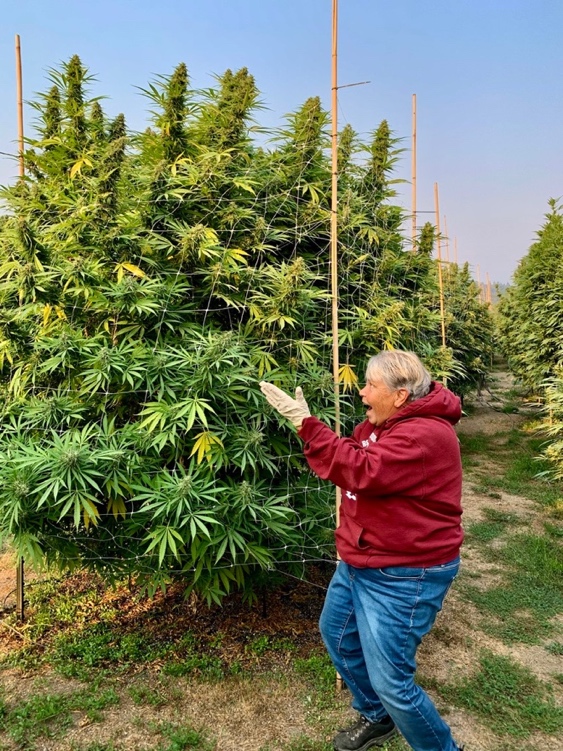 “Ventoso,” in Portuguese and Spanish, means “windy.”
“Ventoso,” in Portuguese and Spanish, means “windy.”
Linnet says, “I’m Portuguese. The first thing I noticed when I moved here was it was constantly windy. I thought, ‘It’s like a hurricane here!’ That first season, the wind came up and blew every plant over.”
As a long-time resident of Covelo, Linnet has strong feelings about how regulation has affected cultivators.
“It’s complex here in Covelo. When all we had was the traditional market, we believed we were all on a level-playing field. There was a historical tradition of people helping out newcomers, who would then move on to farm themselves. During the War on Drugs,
there were an enormous number of busts, mostly on tribal land. This caused a huge problem between Native and non-Native folks. Then we went through the Full Court Press eradication era, where law enforcement was knocking door-to-door,” says Linnet.
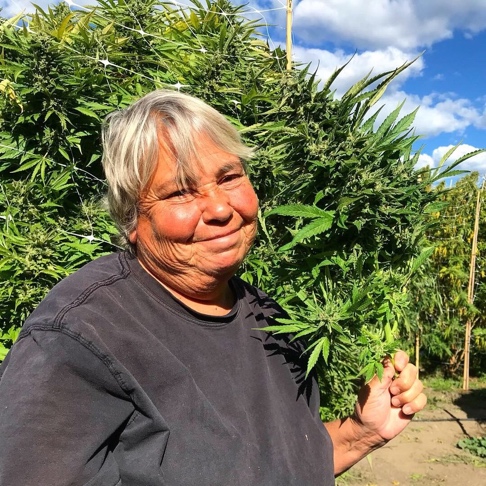
She notes the racial disparities when it comes to enforcement and support of local farmers.
“In the past, white, privileged people entered the market and excelled. Some folks supposed member of ‘cartels,’ an oversimplified label some use for any Latino person- became targets. It was OK when it was just the traditional market and white folks had Mexican folks working for them. But when the Latino population got their own land, things were not OK anymore. The legal market emerged, and the level-playing field disappeared.”
“When 64 passed, many old-timers retired or remained in the black market,” Linnet continues.
“Many of our best legacy growers were left behind, unable to transition.”
At 67, Linnet is not optimistic about the future. “I’ve been here a long time, with a lot of life lived. I have real concerns. I’m not seeing things change for the positive. People are struggling. The market is crashing. People can’t enter the industry. Farms don’t have direct access to customers, which is why events like the KMI are so important. How we overcome all these hurdles, I’m not sure. That book hasn’t been written. It’s an important time to band together.”
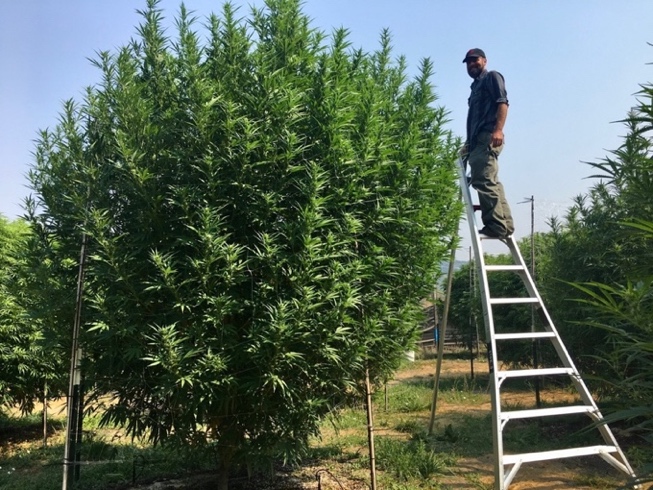 The trio agree that consumer education is key to their future. “Farmers don’t have time and energy to educate. If we did, we’d be screaming from the rooftops about how terpenes and other cannabinoids are as significant as THC. This is important because the quality and experience of cannabis is so much more than THC percentage,” says Linnet, “And all those terpene and cannabinoids affect everyone differently. It’s all about helping folks to learn what works best for them, which often has nothing to do with that THC number.”
The trio agree that consumer education is key to their future. “Farmers don’t have time and energy to educate. If we did, we’d be screaming from the rooftops about how terpenes and other cannabinoids are as significant as THC. This is important because the quality and experience of cannabis is so much more than THC percentage,” says Linnet, “And all those terpene and cannabinoids affect everyone differently. It’s all about helping folks to learn what works best for them, which often has nothing to do with that THC number.”
Ventoso Farms entered Goji OG in the Kure Mendocino Invitational. “The genetics come from Bodhi Seeds, and we’ve been growing it for at least six years. It’s a very fun plant,” says Alex. “The plants get really large and leggy but grow beautifully.”
“The crystal shines in the sun,” says Michelle. “It’s a giggly, fun, focused high. I can smoke it all day.”


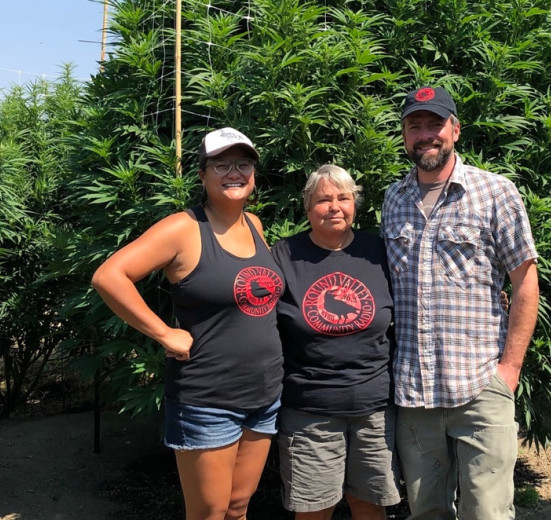

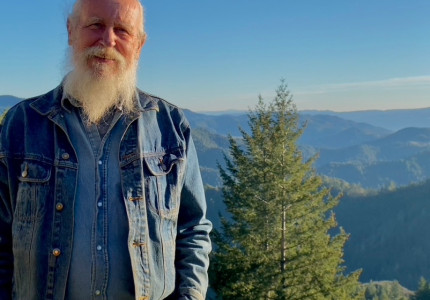
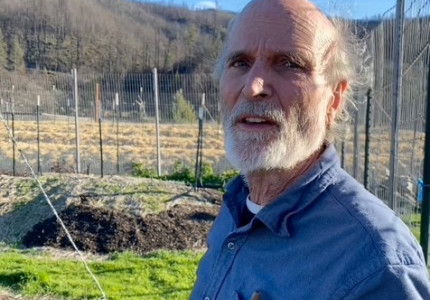
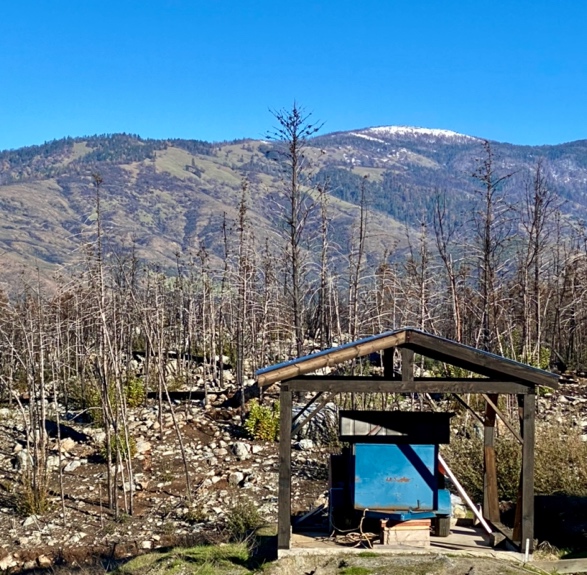 “I’ve only quit smoking three times since 1964,” he smiles.
“I’ve only quit smoking three times since 1964,” he smiles.